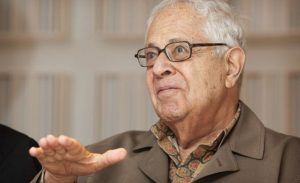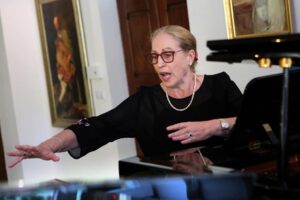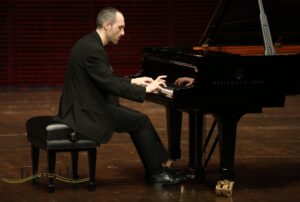The celebrated pianist Gary Graffman has been a major figure in the music world since winning the prestigious Leventritt Award in 1949.
For the next three decades he toured almost continuously, playing the most demanding works in the piano literature both in recital and with the world’s great orchestras. He also made a series of highly acclaimed recordings for Columbia (CBS) and RCA, including concertos by Tchaikovsky, Rachmaninoff, Prokofiev, Brahms, Chopin and Beethoven with the orchestras of New York, Philadelphia, Cleveland, Chicago and Boston, and with such conductors as Leonard Bernstein, Zubin Mehta, Eugene Ormandy and George Szell.
In 1979, however, Mr. Graffman’s performing career was curtailed by an injury to his right hand. His performances are now limited to the small but brilliant repertoire of concertos written for the left hand alone, most of them commissioned early in the century by Paul Wittgenstein, who lost his right arm in World War I. In addition to the famous Ravel Concerto, these include major works by Prokofiev, Britten, Richard Strauss, Franz Schmidt and Erich Wolfgang Korngold. Mr. Graffman played the North American premiere of the latter concerto, written in 1924, with Zubin Mehta and the New York Philharmonic in 1985 and has recorded the Strauss “Parergon” for Deutsche Grammophon with the Vienna Philharmonic led by André Previn.
The reduction in Mr. Graffman’s concert activity has provided him with a remarkable opportunity to expand his horizons beyond the stage. Most notable has been his leadership of the renowned Curtis Institute of Music in Philadelphia. He first joined its piano faculty in 1980 and became Director of the all-scholarship conservatory in 1986, following such illustrious predecessors as Josef Hofmann, Efrem Zimbalist and Rudolf Serkin. He was appointed President of The Curtis Institute in 1995, a position he served until May 2006.
Gary Graffman’s performing career was auspiciously linked to his academic life in 1993, when he joined conductor André Previn and the Symphony Orchestra of the Curtis Institute of Music for the world-premiere performances of Ned Rorem’s Piano Concerto No. 4 (for the Left Hand). Dedicated to Mr. Graffman by the Pulitzer Prize-winning composer—who is also a Curtis alumnus and faculty member—the concerto was performed at Philadelphia’s Academy of Music and, a day later, at Carnegie Hall. A compact disc recording of the premiere is available on New World Records. He went on to perform this work with the San Francisco Symphony and Zurich’s Tonhalle Orchestra.

In April 1996 Mr. Graffman performed the world premiere of William Bolcom’s “Gaea” Concerto for Piano and Two Left Hands with his friend and colleague Leon Fleisher. The work, commissioned jointly by the Baltimore, St. Louis and Pacific symphonies, was given its premiere by the two soloists and David Zinman and the Baltimore Symphony, first in Baltimore and then at Carnegie Hall. It was subsequently heard with the Saint Louis and Pacific symphonies and, in November 1998, with the Philadelphia Orchestra, again with David Zinman conducting.
In continuing his championing of new works for piano left hand and orchestra, in 2001-02 Mr. Graffman gave world premiere performances of three concertos, all of which were written for him: Daron Hagen’s “Seven Last Words” with the New Mexico Symphony and Buffalo Philharmonic; Richard Danielpour’s “Zodiac” Variations with the National Symphony in Washington, D.C.; and Luis Prado’s Concerto for Left Hand with the Chamber Orchestra of Philadelphia. In March 2003 he premiered another concerto written for him, this one by Stanislaw Skrowaczewski, with the Minnesota Orchestra. This work was recorded by Reference Recordings.
In the summer of 2005, Gary Graffman received an invitation to head the piano department at the new Canton International Summer Music Academy in Guangdong, China, giving him an opportunity to explore his love of education, chamber music, and Chinese culture. He has also participated in the Santa Fe Chamber Music Festival, Chamber Music Northwest and the 10th Anniversary of Morningside Music Bridge held in Shanghai.
Gary Graffman is the author of the highly praised memoir, “I Really Should Be Practicing,” published by Doubleday in 1981 and issued in paperback by Avon the following year. In 2011, a Chinese translation was released in Taiwan. He has also written popular articles on non-musical subjects and found time to pursue a scholarly interest in Asian Art (which he collects) and photography. He has received honorary doctorates from the University of Pennsylvania and The Juilliard School, among others. He has received honors from the City of New York with its Handel Medallion, the City of Philadelphia on its Walk of Fame, and the Commonwealth of Pennsylvania as recipient of the Governor’s Arts Award, recognizing him for his varied accomplishments, including his “leadership of Curtis.”
Gary Graffman was born in New York, of Russian parents, and began to play the piano at age three. His father, a violinist, gave him a small fiddle, but when the instrument proved too cumbersome, he began piano lessons, though a return to the violin was planned. The young Graffman’s affinity for the piano soon became evident, however, and at seven the Curtis Institute accepted him to study with the renowned Isabelle Vengerova—exactly 50 years before he would become the school’s director, a position he held through May 2006. After graduation from Curtis, he worked intensively for several years with Vladimir Horowitz and, during the summers, at the Marlboro Music Festival with Rudolf Serkin.









